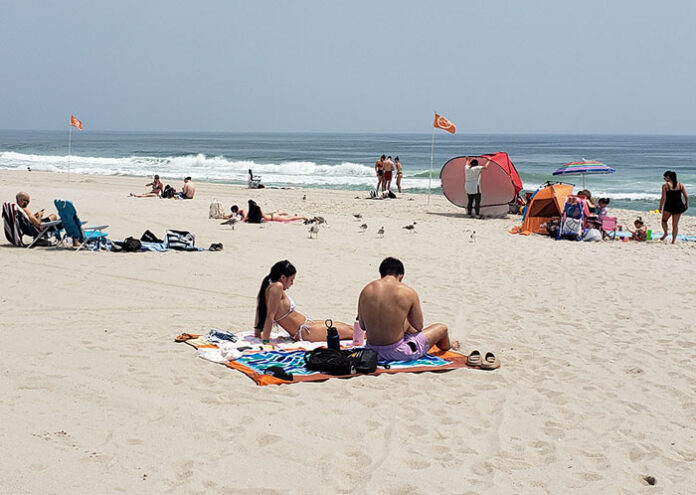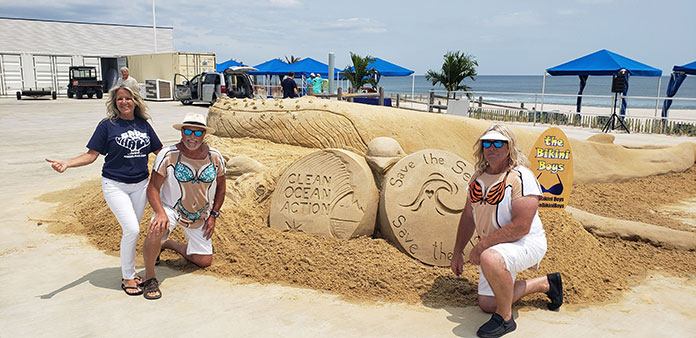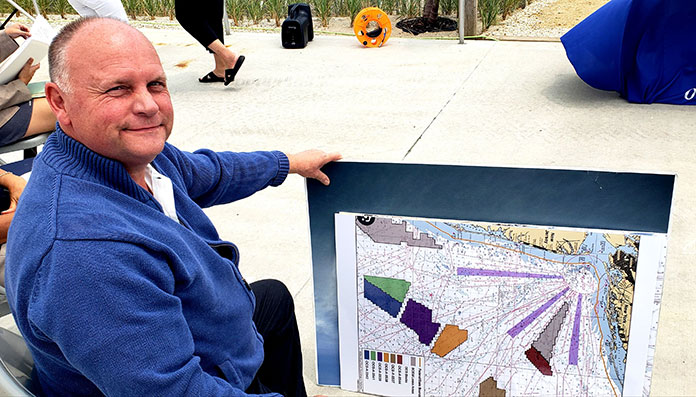
SEASIDE PARK – Calling themselves “Ocean Rebels for the COZ” members of Clean Ocean Action (COA), Mayor John Peterson, naturalist Trisha DeVoe and others came out to promote for the aquatic environment during World Ocean Day.
It was noted with some irony that the observance, held at Funtown Beach along Stockton and North Ocean avenues in the borough, was originally scheduled to take place on June 8 and was postponed for a week due to dangerous air levels caused by smoke from Canadian wildfires.
Those present noted that after four decades of progress in ocean protection, new and old threats were being fast tracked that could impact the ocean of today.
Mayor Peterson recalled the fights he was involved with to close the Ciba-Geigy pipeline off Third Avenue in Ortley Beach and syringes washing up on the beach decades ago from New York City garbage barges.
He also noted the more recent beaching of a large whale dubbed “Wendy” who was buried a short distance from the press conference and he’s concerned that things are going backwards.
“We can work together to increase citizen participation, and to raise public awareness of the vital need to protect the ocean, our many ocean marine species, our fishing industry and tourism and the very way of life of the Jersey Shore,” the mayor added.

Peterson said he hoped to see “officials of all elected levels of government, up and down the Jersey shore” in joining COA in making the public aware “of the threats to our ocean and what can happen if we become complacent.”
Lavallette resident Brick Wenzel spoke to Jersey Shore Online.com from the perspective of a commercial fisherman.
“I am the fishing liaison for the Fishermen’s Dock Cooperative out of Point Pleasant Beach. I have been a licensed commercial fisherman since 1982. When you look at the industrialization of our ocean, the commercial fishing industry is the most heavily impacted blue water economy with the industrial build out.”
He brought along some ocean maps and charts to the event to show some of the problems that commercial fishermen were facing and what he said were missteps by state authorities. There was an area that had been leased out by the government that is highly traveled by marine life. He said it never should have been leased out.
COA members announced an action campaign that calls upon citizens to become voices for the sea to improve and protect the ocean, including from new and harmful ocean industrialization. They advocated for permanent protection of the New York/New Jersey Bight.
COA Advocacy Campaign Manager Kari Martin said, “it is unfathomable to see the lack of investigation and lack of transparency into the string of deaths of whales and other marine mammals, especially with endangered species at grave risk.”
“While federal agencies so boldly and confidently contend that offshore wind energy has nothing to do with the deaths of these marine mammals, they have provided no evidence. In fact, the agencies highlight ‘noise’ as a major factor in marine mammal harm. This is alarming as the impacts on marine life from noise are only growing and intensifying with the increase of offshore wind activity. That’s why we need a pilot project,” she added.
The Clean Ocean Zone was launched as a campaign against old, new, and renewed threats. The organization continues to call for a pilot project to determine the true impacts of offshore wind industrialization, and continues to serve its mission to stop ocean pollution sources.

“We have come a long way and the ocean is now thriving. Everyone knows the ocean is key to the health of the planet, but few know a healthy ocean is also the planet’s best buffer against climate change. Sustaining a healthy ocean is the key to solving climate change,” COA Executive Director Cindy Zipf said.
“The ocean is our last great open space, which should not be sold, leased, developed, industrialized or used for profit. It must be protected and preserved. There is a connectedness and balance to all of our natural environments and ecosystems; harming one will have a ripple effect on others, and on us,” said Leslie Mangold, concerned citizen and ocean advocate.
Mangold added, “we cannot stand idly by and let the ocean be used as collateral damage in the fight against climate change. If we do, then we are complicit in helping to destroy it.”
During the event, COA identified some of the state and federal actions that have caused alarm and the need for a strong comprehensive law to protect the ocean. These include:
- President Biden’s Executive Order calling for 30 gigawatts (30,000 megawatts) of offshore wind by 2030 along with fast-tracking implementation without transparency, due diligence and good science, as well as concerns about the undermining of agencies that protect marine life and the environment and national security.
- The Biden Administration’s Ocean Climate Action Plan, which includes ocean injection of carbon, mining, and massive scale aquaculture and ocean confined animal feed lots.
- The Inflation Reduction Act of 2022 (IRA) ties offshore wind development (OSW) to offshore oil and gas development.
Off shore wind has a connection to increasing fossil fuels in that “during the 10-year period after the IRA was enacted, the Bureau of Ocean Energy Management (BOEM) may not issue a lease for offshore wind development unless the agency had offered at least 60 million acres for oil and gas leasing on the Outer Continental Shelf in the previous year,” Zipf added.
She noted that the state “is fast-tracking permits and does not have a robust action plan to ensure ocean protection. COA has submitted numerous detailed comments on different projects, permits, rules, and authorization highlighting the lack of due diligence, transparency, and good governance.
Zipf said, “while some elements of these programs do help address climate change, such as more green infrastructure, energy reduction may do so by undermining the health of the ocean, the overall drive is to industrialize the ocean at an unsustainable scale.”
Those in attendance heard the sounds of a whale through a recording that was played. “Whales are a powerful weapon in the fight against climate change. We need to protect the ocean and save our whales now,” DeVoe said. She is also a conservation biologist and the founder of SaveOurWhalesNow.org.
“As a young adult who will soon be entering the field of environmental advocacy post-graduation, the threat of ocean industrialization is alarming. My generation understands the urgency surrounding climate change, as we know this will be the world that we inherit and make our lives in,” COA Ocean Advocacy and Policy Intern Fiona Griffin said.
“Climate change solutions must not come at the cost of the life that makes our oceans and ecosystem so healthy and beautiful. When looking at the 526,066 level A and B marine mammal takes pending to be authorized in the last year, it is clear to me that we have stopped caring about these important creatures,” Griffin added.

The event also included a large whale sand sculpture as a backdrop, the work of the Bikini Boys who worked on it for 10 hours. Later in the day, the public was invited to speak to advocates at two action “stations” and “comment booths.”
Some of the actions available for people to participate in were signing and sharing petitions, submitting comments in real-time to the Bureau of Ocean Energy Management (BOEM) regarding the 2,000 plus page Draft Environmental Impact Statement (DEIS) for two offshore wind projects, Atlantic Shores 1 and 2, and signing up to be engaged in the campaign for the COZ either as campaign leaders, petition captains, outreach and advocacy volunteers, and more.
“What the ocean needs now more than ever are the voices of all the people who enjoy and/or depend upon the rich vibrant living resources to contact their elected leaders to take a stand to save the sea, and save the planet,” Zipf added. The organization has the many action steps available at CleanOceanAction.org for the public to complete and share.






